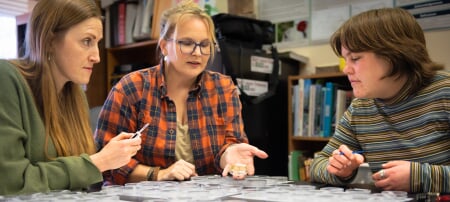Houghton County Aiming for $5 Million Energy Prize, with Help from Michigan Tech
Georgetown University is offering a $5 million prize for the American community “that leads the way in energy efficiency,” and a Michigan Technological University student thinks there’s no reason Houghton County shouldn’t win.
“There aren’t a lot of small communities with a great technological university in their midst,” said Abhilash Kantamneni, a graduate student in computer science. “I think we have a shot at it.”
The Georgetown University Energy Prize was established to encourage communities to come up with creative ways to cut energy consumption. With Scott Ala, chair of the Houghton County Board of Commissioners, Kantamneni has assembled a team of community leaders, University experts and student groups to develop a broad-based plan. Some of their initial strategies involve the following:
• weatherization
• solar and wind energy
• biomass
• geothermal energy
• tax incentives
• rebates for utility customers
• smart meters
Houghton County is one of approximately 35 entrants nationwide to advance past the first stage of the competition, which is open to communities with a population between 5,000 and 250,000.
Participants are challenged to develop practical, innovative ways to reduce the use of natural gas and electricity in their communities. In addition, they are charged with educating students and the public on the environmental costs of conventional energy sources and working with businesses, governmental units and utilities to reduce energy use over the long term.
Houghton County is applying to the Georgetown Energy Prize organization for grant funding to help develop its plan, said Ala. He is optimistic about their chances. “We are in a unique situation: we’re rural, we have a technological university, and we have a very strong desire to do this. At the very least, we’ll discover new ways to conserve energy in our area.”
Should Houghton County win, it would spend the $5 million on energy efficiency measures to benefit the community as a whole.
“We have a visionary local government that’s willing to work with Michigan Tech and help educate the community,” Kantamneni said. “We have one of the best engineering schools in US, with huge expertise in green energy. Together, we could be a model community, an example for everyone.”
If you are interested in being part of the Energy Prize team, contact Kantamneni at akantamn@mtu.edu or 906-370-1529.
The ad hoc committee includes Kantamneni, Ala, county commissioner Tom Tikkanen of Calumet Township, Michigan Tech social sciences faculty members Richelle Winkler and Chelsea Schelly, Lynn Artman of the School of Technology, Melissa Davis of the nonprofit NewPowerTour, Keweenaw Research Center Director Jay Meldrum, Sam Lockwood of the Keweenaw Geothermal Research Group, Kim Stoker of the Western Upper Peninsula Planning and Development Region, Phil Musser, former director of the Keweenaw Economic Development Alliance, and Elmore Reese from Main Street Calumet. Representatives from utility companies UPPCO and SEMCO are participating in the effort, along with energy-conservation businesses and organizations such as Michigan Saves, Efficiency United and BlueTerra.
The Georgetown University Energy Prize is sponsored by the American Gas Foundation, the Joyce Foundation, the US Department of Energy, the National League of Cities, the National Association of Counties, the American Council for an Energy-Efficient Economy, the National Science Teachers Association, the Alliance to Save Energy, the American Public Power Association, the Edison Electric Institute, the National Rural Electric Cooperative Association and Deloitte Consulting.
Michigan Technological University is an R1 public research university founded in 1885 in Houghton, and is home to nearly 7,500 students from more than 60 countries around the world. Consistently ranked among the best universities in the country for return on investment, Michigan's flagship technological university offers more than 185 undergraduate and graduate degree programs in science and technology, engineering, computing, forestry, business, health professions, humanities, mathematics, social sciences, and the arts. The rural campus is situated just miles from Lake Superior in Michigan's Upper Peninsula, offering year-round opportunities for outdoor adventure.




Comments